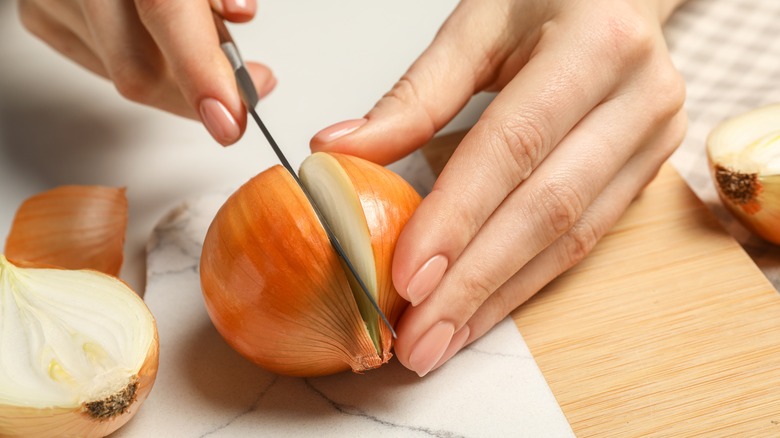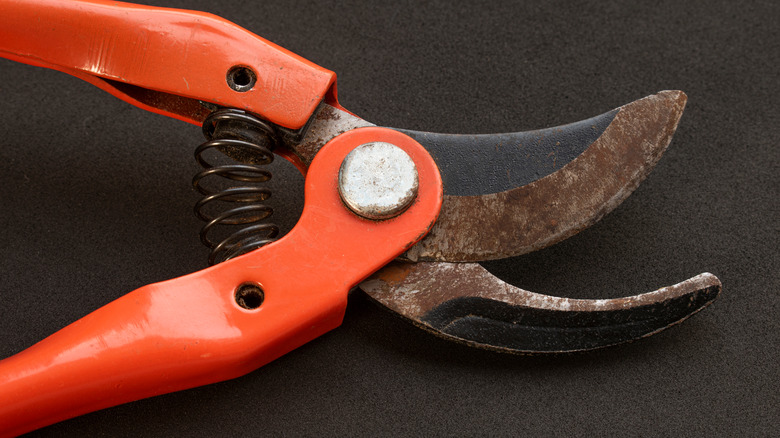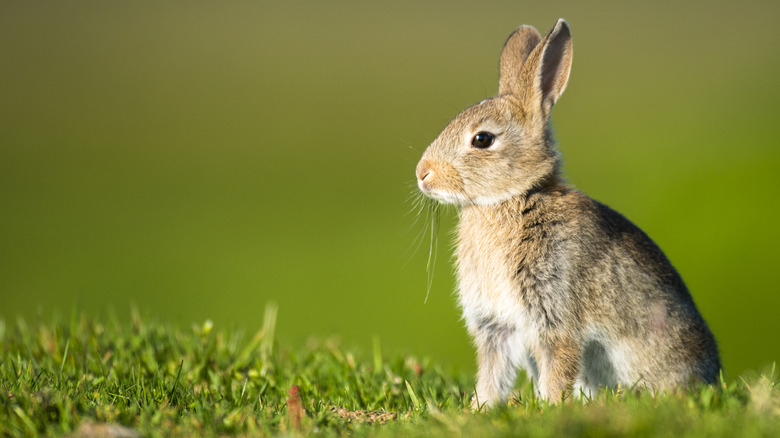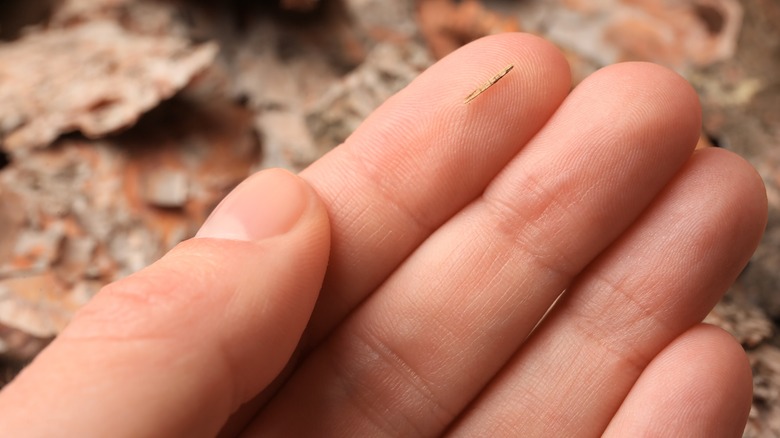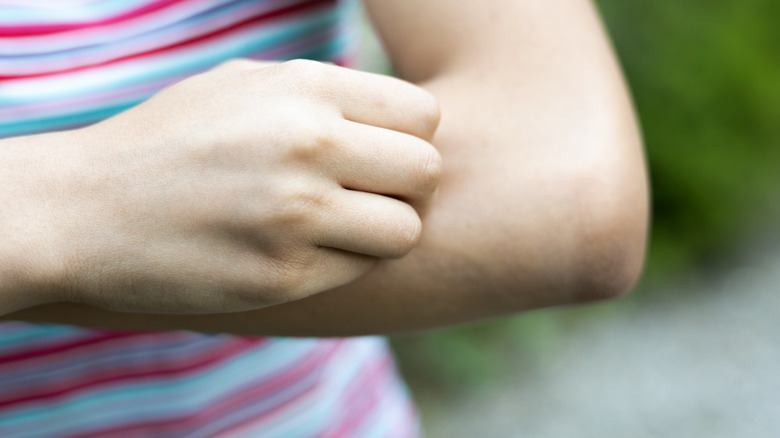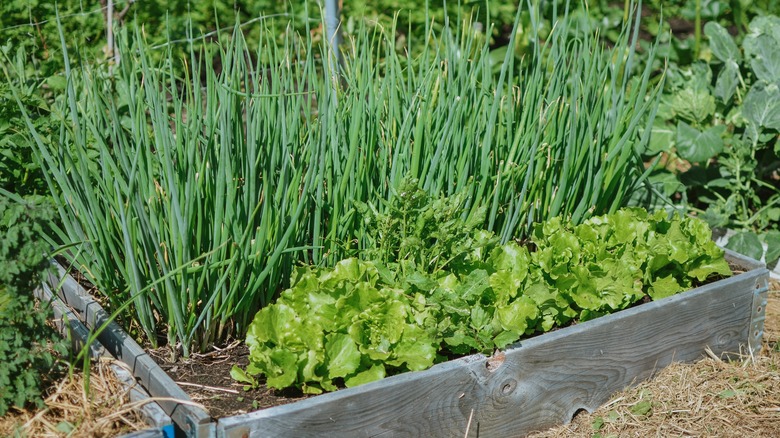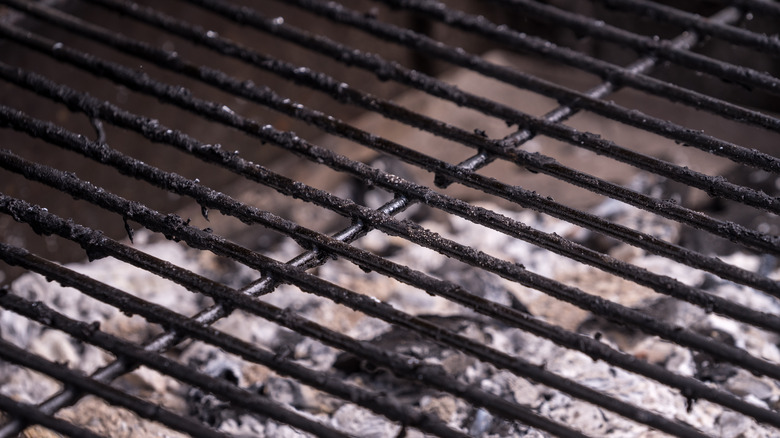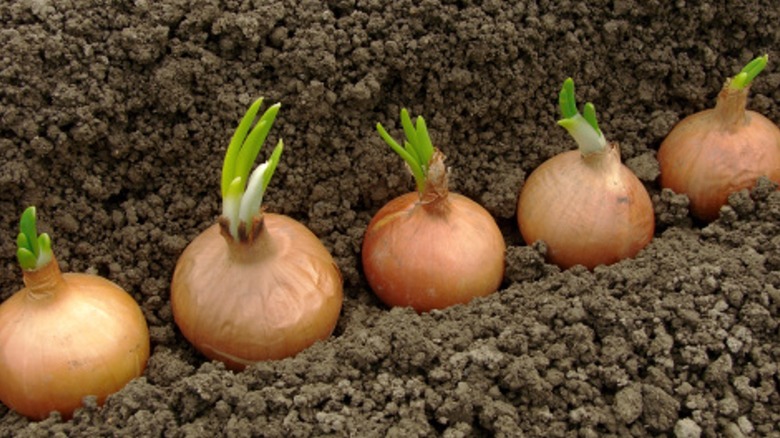7 Unexpected Onion Hacks To Use In Your Yard & Garden
Maintaining your yard and garden can be a time-consuming job. Between keeping pests away from your plants, stopping weeds from popping up all over the place, cleaning lawn and garden equipment, and scrubbing grilling equipment, it can feel like a full-time job. Would you believe that a few simple onions — whether grown in your garden or purchased at the grocery store — can help you with some of these tasks, along with several others?
Well, believe it or not, onions are not just useful for eating. There are several surprising hacks that can help you around the house and in the yard. Below, we've highlighted some of the best ways to put onions to work, from using the vegetable to remove splinters to tackling cleaning tasks. Since they're so useful, you just might want to stock up on them during your next grocery trip — or plant more in your backyard garden.
Use onions to remove rust from garden tools
We all understand the frustration of this situation: Your favorite pair of pruning shears accidentally got left outside on a rainy day, and when you discover the mistake, rust has already started forming on the tool. Well, if those shears — or other gardening tools — are made from stainless steel, you're in luck. Onions can help remove rust from that particular metal (including rusty stainless steel knives). The reason this veggie is an effective rust remover is because of the amino acid sulfoxides it contains. When these amino acids are exposed to oxygen in the air, they form sulfenic acid. Sulfenic acid can remove rust, so rubbing an onion over rusty areas can work to eliminate the reddish-brown buildup covering your gardening tools.
In order to use onions to effectively remove rust, you'll also need emery cloth, which you can get at hardware stores. This abrasive fabric will help smooth the surface and maximize the effectiveness of the onion. After rubbing the rust-covered areas of the garden tool with the emery paper, use the flat side of a cut onion to rub over them again. Continue rubbing until the rust is removed, then rinse the tool with hot water and dry it thoroughly before storing. Also, note that onions are most effective at removing rust from stainless steel. While you can try this hack on tools made from other types of metal, you may not experience the same results.
Onions can keep rabbits away from your garden
Did you know onions are a vegetable that can help control pests? Specifically, if you're facing a rabbit infestation in your garden, onions can aid in keeping these cute — but destructive — pests away. As you know from cutting and cooking with them, onions have a very strong odor that many people would even describe as pungent. As it turns out, rabbits are also not a fan of their strong smell and will try to avoid areas where they detect it.
The best way to use onions to keep bunnies away from your garden is to plant them. As they grow, they'll still expel that odor that rabbits find repulsive. If you interplant onions with the other flowers or veggies you want to grow, the rabbits will be much more likely to stay away from your garden completely. To maximize the effectiveness of this hack, consider mixing in a few additional plants that rabbits also don't like, such as asparagus, basil, squash, or tomatoes. You'll keep the rabbits away and grow ingredients for some delicious dishes — a true win-win.
Use a slice of an onion to remove splinters from your skin
When you're working in the yard, it isn't uncommon to get a splinter. If it doesn't come out with ease, an onion might be able to help you remove it. This is based on the assumption and anecdotal evidence that enzymes found in the onion can help pull the splinter closer to the upper layer of your skin, making it easier to extract.
If you want to give this hack a try, you'll need to exercise some patience, because it won't produce immediate results. Slice off a very thin piece of the onion, place it directly over the splinter, and cover it with a bandage to keep it in place. Give the onion juices several hours to penetrate the skin (overnight would be best) before removing the bandage and trying to pull out the splinter.
If the hack doesn't work, and you still can't remove the splinter with ease, it's best to pursue medical attention to avoid increasing the risk of infection. There are also times when you should skip this hack and seek immediate medical attention, such as if you have a very deep or painful splinter, as these can be more likely to result in an infection if they aren't promptly removed. If you notice any white or yellow discharge from the area with the splinter or your skin appears redder or harder than usual, it is also best to contact your doctor, as these are signs of an infection.
Get some relief from bug bites
Bug bites are all but inevitable when working in the yard or garden, especially during the summertime. When you're looking for some relief from the constant itch associated with mosquito bites, look no further than that onion sitting in the pantry. A pigment in the onions, quercetin, works as an anti-inflammatory. When applied over the bite, it can make it less itchy.
If you want to see — or feel — for yourself how much an onion can alleviate itchiness caused by a bug bite, all you need to do is cut the onion and rub a flat piece of it against the affected area on your skin. Give the onion juices and quercetin a little time to work, and then rinse your skin once you experience relief. Another benefit of using an onion for this task is that they also work as an antifungal, which means that your chance of suffering from an infection from the mosquito bite will be lowered.
Onions make an excellent companion plant in the garden
If you've never heard of companion planting, it is a gardening strategy centered around boosting plant health and growth, without the use of chemical pesticides or fertilizers. Companion plants are purposefully paired with other plants to help create optimal growing conditions through enhancing the nutrients in the soil, deterring pests, and more. As it turns out, onions can make a wonderful companions. Onions and lettuce are just one example of a top-notch companion plant pairing. Other plants you could pair onions with include cabbage, kale, cauliflower, and others in the brassica family.
The reason onions can make a good companion plant comes back to their unpleasant odor. It can help keep pests that typically feast on brassica plants and others away, allowing them to grow and thrive. Aphids and spider mites are two types of pests that will be less likely to ravage your garden when planted near onions. You may also consider planting onions alongside spinach, lettuce, or carrots. Onions can work well as a companion plant with these veggies because they won't compete for the same nutrients in the soil. Onion bulbs are much shallower than these other vegetables, so they aren't pulling nutrients from the same sections of the soil.
Clean your grill using an onion
Not much can match the flavor of hot dogs, burgers, steaks, and other foods cooked on the grill. However, after cooking these items, the grill racks are often left covered with burnt-on pieces of food. Getting this gunk off the grates can be challenging — and you don't want to just leave them dirty due to safety concerns (both related to fire and food safety) — not to mention the negative impact they can have on the taste of the future foods you grill.
If you don't have a grill-cleaning brush — or want to sip the potential risk those sharp bristles can pose — try using an onion the next time you need to clean your grill. The allicin in onions — the same compound that causes many to cry when cutting the veggie — also works as an antibacterial to leave the grill safe to use for future cooking endeavors. With the grill still warm, place half an onion on a grilling fork and rub its cut, flat side across the grates several times. The heat from the grill should help prevent the food from sticking and allow it to be released. If you encounter any stubborn areas, squirt a little white vinegar or lemon juice over them to help release the gunk.
Use an onion to grow more onions
Did you know that it is possible to grow new onions from old ones? Well, believe it or not, it's true. However, it isn't as simple as just taking an old onion and covering it with some soil in the garden. First, you must wait for the onion to sprout. Once it has sprouted, peel the skin and all the inner layers down until you find the spouts — taking care not to damage the roots as you work.
Once you reach the inner sprouts, carefully separate them into individual sections using a serrated knife. There are typically three sprouts for each onion, though it can vary. Now that you've separated the sprouts, you can plant them in the ground (as long as each one still has some of the original roots attached to it). Be sure to plant the sprouts within a few weeks of separating them.
Before planting the sprouts, you'll want to scope out your garden for the best spot. Onions do best with a lot of direct sunlight — 12 hours minimum, if possible — so choose an area in the yard or garden accordingly. The onion sprouts only need to be placed about an inch beneath the surface of the soil with a few inches between them to provide adequate space for the new onions to grow. Be sure to water the plants once a week, or a bit more if the soil becomes too dry. Your new onions should be ready to harvest after about three months.
